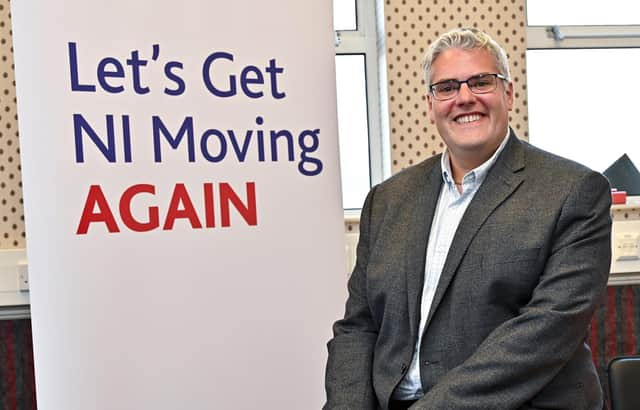Owen Polley: Polling shows risk to DUP if it changes course on Stormont


The latest research from the University of Liverpool’s Institute of Irish Studies, which takes as its theme Voting, Identity, Trust, and Media, is a good example.
Like most polls, it suggests that the idea that nationalists need ‘one more push’ to secure and win a referendum on Northern Ireland’s future is fanciful. When they were asked how they would vote tomorrow, 11% more respondents favoured staying in the UK than supported our annexation by the Republic.
Advertisement
Hide AdAdvertisement
Hide AdIt’s not just that. Well over a third of Catholics remain unpersuaded by the case for an all-Ireland republic. They would either vote for the Union in a referendum, wouldn’t vote at all or haven’t made up their mind.
It’s hardly a decisive statistic, but it casts doubt on the nationalist argument that demographic changes will inevitably deliver a 32-county state. And that is against a backdrop of almost ceaseless media stories and panel discussions that try to imply the republican campaign is on the brink of success.
The university’s research actually suggested that supporters of ‘pro-unity parties’ are less motivated by their desire for annexation than by other issues. Less than a fifth of Sinn Fein voters cast their vote primarily because they ‘wanted Irish unity’. By contrast, one third said they desired to ‘show support for a return to Stormont’.
The picture was starkly different for the DUP. – 55% of its voters wanted, above all else, to ‘show support for NI’s place in the Union,’ and it’s not difficult to work out why that might be. Pro-Union voters are no more preoccupied with constitutional issues, from day to day, than their republican counterparts. But they do recognise that the Northern Ireland Protocol and the Windsor Framework pose a greater threat to our place in the UK than an early border referendum.
Advertisement
Hide AdAdvertisement
Hide AdIt’s fair to assume that, in May, they went to the polls with that challenge to the Union foremost in their minds, while even Sinn Fein’s supporters saw through its contention that a good result would help the party secure its constitutional objectives within two election cycles.
The survey’s results will give Sir Jeffrey Donaldson a lot to think about, as he tries to manage differences of opinion within the DUP and contemplates what to do in the autumn.
Recently, he wrote an open letter to members, accusing some of them of “briefing against” the party and damaging its “electoral prospects”. Many commentators interpreted this as an attack on rivals within the DUP, who do not want to return to Stormont in the autumn. The implication, of course, is that Sir Jeffrey would restore power-sharing tomorrow, if he could, and it would be wrong to dismiss these theories out of hand.
At the same time, the party’s website recently published a withering statement on the Windsor Framework by Lord Dodds, whose stance on the sea border is sometimes alleged to be at odds with that of his leader. The DUP’s deputy leader, Gavin Robinson, who is seen as Sir Jeffrey’s loyal lieutenant, made stinging comments too, accusing the prime minister of “creating a growing pile of broken promises”.
Advertisement
Hide AdAdvertisement
Hide AdThe party does not yet at least seem to be preparing its supporters for a climb down, though different personalities certainly use firmer language than others.
As the date for the framework’s implementation approaches, its inadequacies, inconsistencies and the government’s deceptions are becoming only more apparent. It’s less and less likely that the DUP will be able to secure a legislative commitment from Rishi Sunak that can be portrayed convincingly as restoring our full place in the UK internal market.
The University of Liverpool survey suggested that DUP supporters were primarily concerned with the way the protocol and framework threatened the Union. It also found that only 17% voted chiefly “to show support for the boycott of Stormont”. That’s a fairly meaningless statistic, though, given that it was possible to endorse a more positive interpretation of the party’s strategy. And even DUP representatives who are dismissive of the idea of re-joining the executive claim that they would like to do so in theory.
The merits and drawbacks of restoring power-sharing are still being debated keenly by unionists. There is a strong argument that Stormont’s continued suspension could start to undermine voters’ faith in Northern Ireland’s viability, and cause them to explore the possibility of other constitutional set-ups.
Advertisement
Hide AdAdvertisement
Hide AdEqually, though, parties including Sinn Fein are already campaigning energetically against things like overdue public sector reform and a shake-up of the health service, that, if they were delivered, could potentially make the executive’s restoration at least partly worthwhile. And some would-be ministers want to get back to work specifically to implement populist schemes that are likely to damage society, like the department of justice’s hate crime legislation.
The DUP argued after May’s election that it had an enhanced mandate to oppose the protocol and framework through its current strategy, and the Liverpool poll does not weaken that contention. It already looks like it will be almost impossible for the party to claim in the autumn that the government has done enough to satisfy its ‘seven tests’. The question will then be whether the DUP can, or should, justify a return to power-sharing on other grounds. At best, that would be a huge risk.